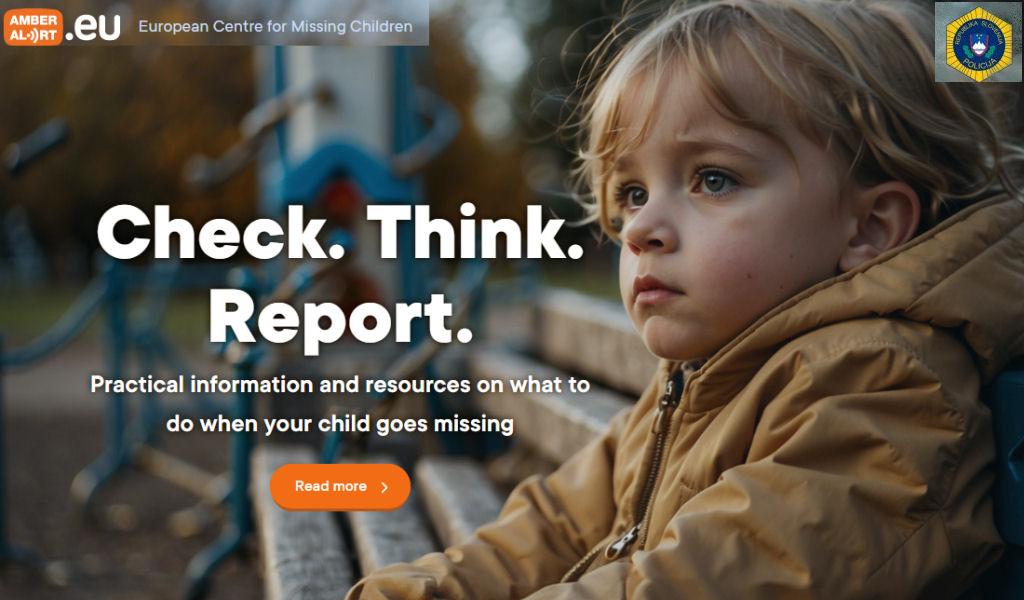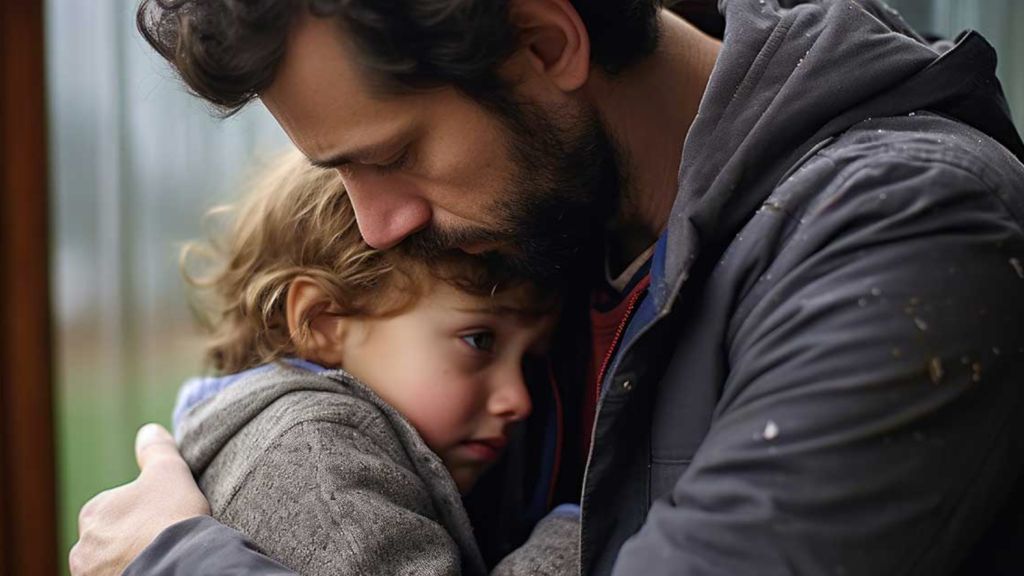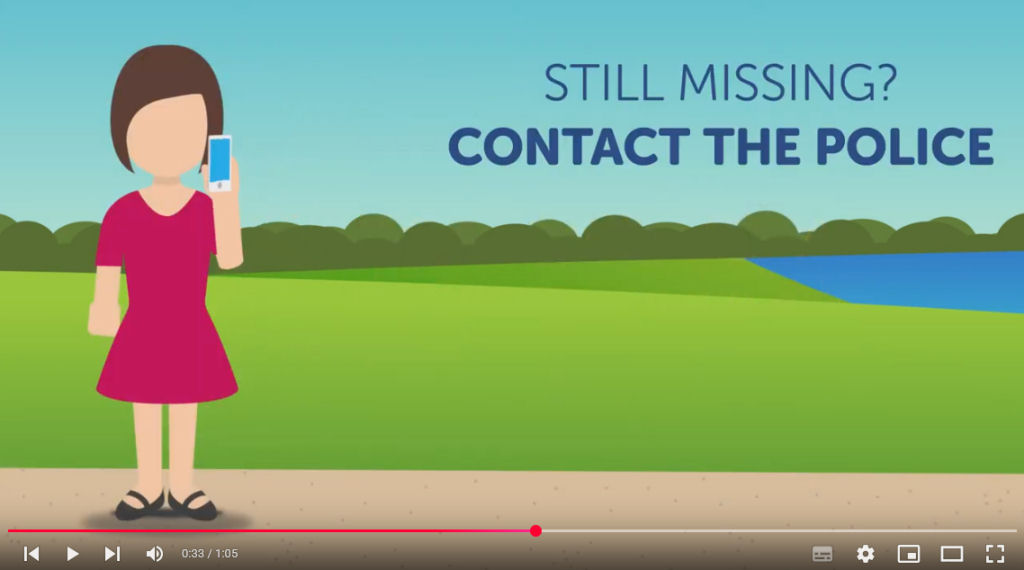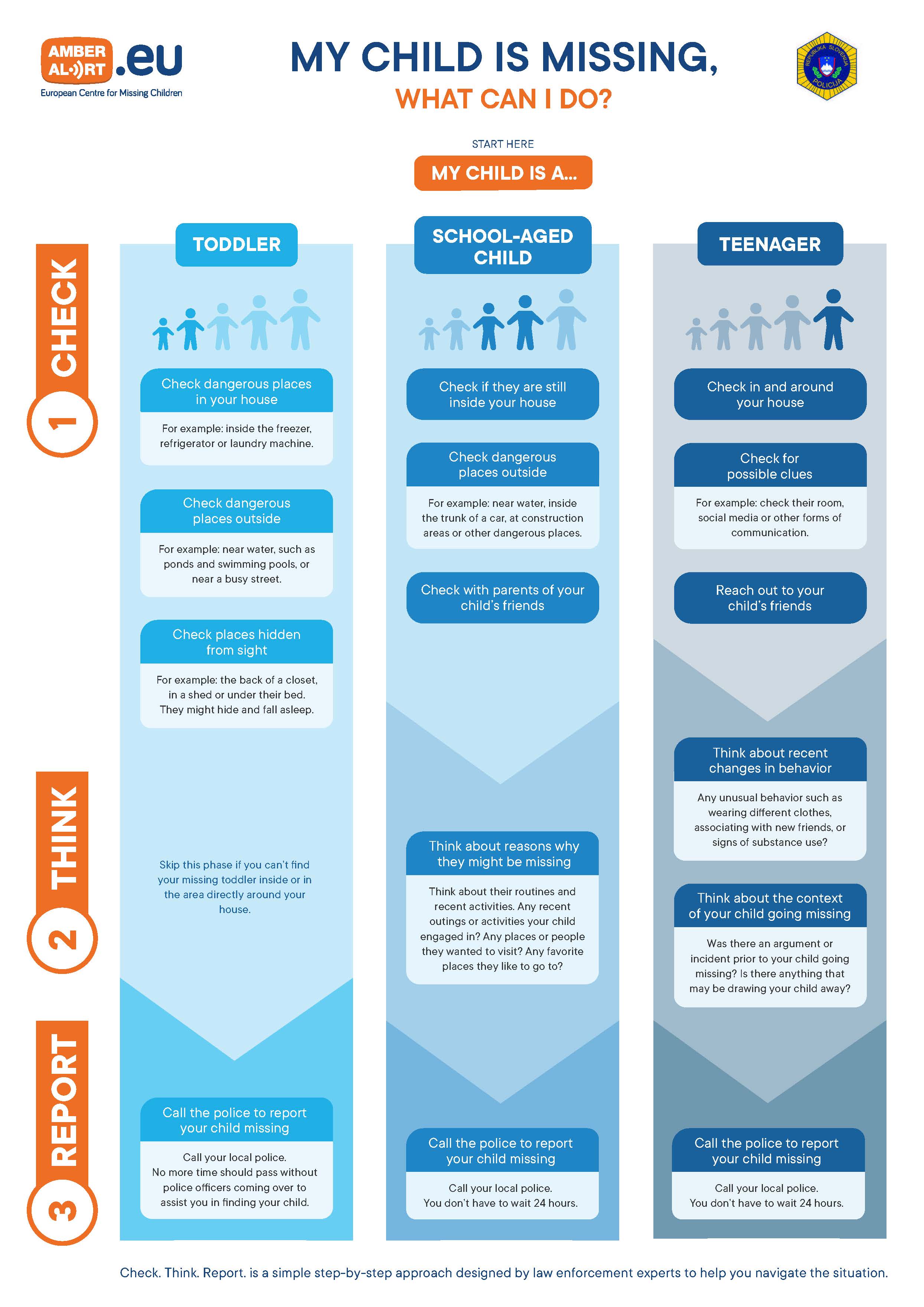In Slovenia, children and adolescents account for a third of all missing persons. Most missing children are reported very quickly and almost 90 percent are found within four hours. Fortunately, all children are found alive and unharmed.

At the Slovenian police, we are aware that the disappearance of a child is an extremely traumatic experience for any family. Parents and guardians face great challenges. In such difficult moments, it is very important to know what to do and which steps are the most important. By raising awareness among parents, we can improve the response time in finding missing children.
If your child is missing, stay calmStart your search where the child was last seen. Toddlers often hide and fall asleep or do not answer their parents' calls, so it is necessary to check previously checked areas, such as the child's room, several times, as the child may have already returned home in the meantime and hidden there in fear of being punished for his actions. Check all dangerous places near the location where the child was last located. Ask other family members, friends and neighbors if they might have spotted him somewhere. If the child is still missing, immediately call the police at number 113! |
For this purpose, we are publishing practical guidelines that will help parents and guardians take quick and effective action in the event of a child's sudden disappearance. It is a simple, multi-step approach, developed jointly by European police experts, to help you find your missing child. Above all, the following three steps,summarized according to the international campaign of the Amber Alert Europe organization (A Step-By-Step Aproach), are crucial: 1) check, 2) think, 3) report.
Step 1: CHECK for any signs of where the child might have gone
Toddlers with limited mobility can still be in or around your residence. It is often the case that the younger the child, the closer to the place of disappearance they will be found, and therefore the closer the search should be. Start by searching in places that can be dangerous for them. Inside your house apartment check a freezer, refrigerator or washing machine. Outside your house, check areas near water, such as ponds and swimming pools, ditches, manholes, or canals, and busy streets. Then check for places where toddlers can hide, such as wardrobes, a garden shed, the attic or under the bed. Remember that toddlers sometimes hide somewhere and then fall asleep.
When searching for school-age children who may already be outside without parental supervision, the search area is expanded. After making sure that the child is not inside your apartment or house, continue the search outdoors, in the immediate vicinity of the home or where the child could be in danger, such as near water, in the boot of a car, at construction sites or similar places where dangerous situations may exist. Then, check with the parents of your child’s friends living in the area if the child is with them.
Primary school children often go to places that are familiar to them, so it is important that parents or caregivers are also familiar with these places. The child will hide where they feel safe, such as under stairs or in buildings where they attend leisure activities, or in locations where they socialize with their peers. It is necessary to check previously checked areas several times, such as the child's room, as he may have already returned home in the meantime and hidden there in fear of being punished for his actions.
Teenagers can go missing for a number of reasons. Before you start looking for your child, check their room, social media, and other means of communication. Then, reach out to their friends and ask them if they might know where your child might be. Teenagers are more likely to confide in their siblings and peers than in adults.

Almost every parent knows the feeling of panic when their child is suddenly out of sight. Fortunately, most children are found quickly. In Slovenia, the majority of missing children are found alive and well, 90 percent even in the first four hours.
There is no need to wait 24 hours to report a missing child, quite the opposite!At the police, we have been warning for many years that the myth that you have to wait 24 or 48 hours to report a missing person is not true.On the contrary, at the police we want the disappearance to be reported as soon as possible, so that we can immediately start implementing activities to trace the missing child. |
Step 2: THINK of any reasons why your child might have gone missing and where they could be
If you cannot find your missing toddler at home or in the immediate vicinity, call the nearest police station and tell them that your child is missing. The police should come to your aid as soon as possible in finding your child.
If your school-age child goes missing, consider the reasons why they might be missing and the places they might be. Think about their daily habits, obligations, and recent activities. Do you recall any recent outings or activities your child may have engaged in? Did they mention any specific place they wanted to visit or a person they would like to see? Are there any favourite places they like to go to?
For teenagers, reflect on any recent changes in your child’s behaviour or circumstances. Have they exhibited any unusual behaviour, such as wearing different clothes, associating with new friends, or showing signs of substance use? These insights could provide valuable clues in locating your child. Also think about what you know about the circumstances of their disappearance? For example, was there an argument or incident prior to your child going missing? Is there anything that may drive your child away? Sometimes, teenagers might not come home simply because they need some space and time to themselves.
Step 3: REPORT the missing child to the nearest police station
Video: What to do when your child is missing
Step 3: REPORT the missing child to the nearest police station
Contrary to popular belief, you don’t have to wait 24 hours to report a missing child. There will be no judgment – your child’s safety is the most important. The police will take necessary action and provide support throughout the process. They’ll also offer guidance on additional steps you can take.
- Be ready to proceed with the process
When reaching out to the police for assistance, it’s important to be prepared for what to expect during the process. Be prepared to answer detailed questions about your missing child, including their physical description, last known whereabouts and any distinguishing features such as birthmarks or scars. The police may also inquire about your child’s recent activities, relationships, and any potential reasons why they may have gone missing. Are there any problems going on in your home/family?
- Give the police as much relevant information as possible
It’s essential to provide as much accurate information as possible to help the police. This includes recent photographs of your child, details of their clothing or belongings at the time of disappearance, and any relevant medical or behavioral information that could assist in locating them. Does your child rely on medications that they don’t have with them? Keep always with you their recent photographs that show your child as they currently look on a normal day. For example, avoid school or portrait-type photos if they don’t reflect how your child typically looks.
|
Key information the police will want from you
|
Maintain open communication with the police throughout the process. This means being readily available to answer any questions they may have, promptly returning their calls, and providing any requested information or assistance. Follow their guidance and instructions. Remember that the police are there to help and support you during this challenging time. It’s also beneficial to share any updates or new information you might receive about your missing child with the police immediately, as it could be crucial to the investigation.

Foto: Amber Alert Europe
How to react when your child returns?
When a missing child is finally found, we feel immense relief, but the duration and circumstances of the search itself can cause many emotions and concerns.
- Update family, friends, and the police
If your child returns on their own, inform the police immediately. The police may need to speak or meet with your child to ensure they have returned safe and well. Let all your family members and friends who helped you know that your child has returned home.
- Allow your child enough time to get used to home after returning
After your child’s return, it’s important to give your child the space and time they need to settle back into their routine and process their experiences. Your child may have endured a traumatic ordeal, and it’s essential to be sensitive to their physical and emotional needs. Offering them the opportunity to enjoy a comforting meal, change into clean clothes, or simply rest can help them feel safe and secure in their home environment once again. These simple acts of care and comfort can provide a sense of normalcy and stability after a period of uncertainty.
- Be happy about your child’s return
Many children fear the initial meeting with their parents. They are often convinced that they will be punished for an action that has triggered fear or anger in their parents. We advise you to remain calm, even if you have been under extreme stress due to your child's disappearance. Express your joy and relief at your child’s return, reassuring him or her of your love and support. Let your child know that together, as a family, you will navigate any challenges that may arise.
- Find help and support
A specialised organisation may follow up with your child to see if they need more support. It is important to reach out and take advantage of any support available to your child, you, and your family. Asking for help is a sign of strength and shows you are taking the issue seriously.
Advice from Amber Alert Europe on what to do when your child is missing
Related content
Personal safety
Searching for missing persons
Amber Alert Europe



